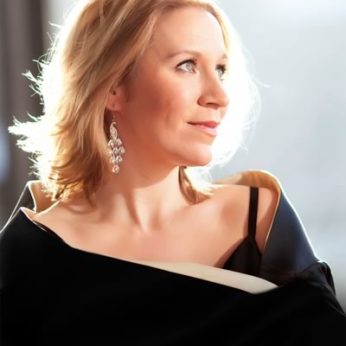Composer: Felix Mendelssohn-Bartholdy (b. 1809 - d. 1847)
Performance date: 06/07/2016
Venue: St. Brendan’s Church
Composition Year: 1936
Duration: 00:26:33
Recording Engineer: Richard McCullough, RTÉ lyric fm
Instrumentation: T-solo, pf
Instrumentation Category:Small Mixed Ensemble
Instrumentation Other: S-solo, 2vn, va, vc
Artists:
Carolyn Sampson -
[soprano]
Kelemen Quartet (Barnabás Kelemen, Gábor Homoki [violins], Katalin Kokas [viola], Dóra Kokas [cello]) -
[quartet]

For obvious practical and historical reasons the Lieder repertoire has been overwhelmingly dominated by the partnership between voice and piano. What one might loosely call vocal chamber music, where other instruments are involved, is comparatively rare except in France. More recently contemporary composers have begun to transcribe classical works, a prominent example being Hans Zender’s composed interpretation of Winterreise that replaces the piano with a small orchestra. Purists tend to be scornful, but Zender’s approach has provided another way into this wonderful music for those who are put off by the traditional format of Lieder. The other reverse arrangements are of course the reduction of orchestral song cycles like Mahler’s Das Lied von der Erde to chamber music proportions. In the days before recordings this enabled wider circulation of new works that otherwise depended on access to a symphony hall and a symphony orchestra. Nowadays with conservatories world-wide producing enormous numbers of highly skilled musicians and orchestral opportunities shrinking as orchestras come under increasing financial pressure, there is a vast array of chamber ensembles seeking out every conceivable chamber combination.
Reimann’s arrangements of familiar Mendelssohn/Heine Lieder enable this group of songs to be presented as a continuous cycle. Although there is no clear narrative thread, the selected songs work well as a cycle about romantic love in much the same way as Schumann’s great cycles. Each song provides a vivid vignette from a series of incomplete love-stories. A journey is hinted at, dreams and nightmares are recounted, mountains are climbed and seas are crossed, many tears are shed and there is the classic Mendelssohnian vision of elves in the moonlight. The songs are through-composed without a break and are linked by six Intermezzi for the quartet, six reflections in Reimann’s own idiom. Reimann goes from simple transcription, via variation to a new composition, bringing these familiar
Copyright © 2025 West Cork Music. All rights reserved.
Designed and developed by Matrix Internet